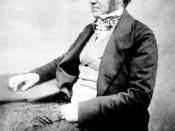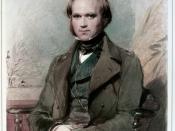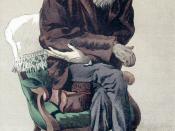In the last chapter, Darwin sums up the general outline of his new approach to nature. He concludes that species have descended from some primordial form through natural selection, which is a long gradual process of modification. Given the production of random individual variations, and the rigid dependence of the wild organism on its environment, there must occasionally arise slight modifications of structure that are useful in the struggle for existence. The individuals having any advantage over others would have the best chance of surviving and of producing their kind.
In a world governed by natural selection, extinction is always a possibility when a species is confronted by a rival that is better adapted than itself. Darwin was aware that many species must have gone extinct, with only a few surviving and diversifying to replace them. He believed that species are constantly tending to specialize, to become better adapted to a particular way of life that avoids competition with potential rivals.
Darwin explains when branching occurs the less-specialized intermediates are eliminated as the branches move further apart. That is why species come to be tolerably well-defined objects, and do not at any one period present an inextricable chaos of varying and intermediate links.
About the question of hybridism, Darwin argues that the distinction is not as sharp as everyone had assumed. There are varying degree of sterility in the hybrids of different species, with hybrids of closely related species often having some fertility. As two originally very closely related forms gradually diverge, their ability to interbreed steadily diminishes until at last they are unable to reproduce at all.
Anticipating objections will be raised against his theory, Charles Darwin agreed that people might have difficulty to believing the natural selection theory at first. The whole groups of allied species appear to have come in suddenly on several geological stages. However, Darwin stated that the geological record is far more imperfect than most geologists believe. That fossils are only produced in unusual circumstances, so most species will have lived and become extinct without leaving any trace in the rocks. Also, local varieties will not spread into other distant regions until they are considerably modified and improved. When they do spread, if discovered in a geological formation, they will appear as if suddenly created there.
Another objection is the formation of unusual and highly complex structures. People would a first find it difficult to believe that a functioning wing, or an eye, could have been created by the kind of process he is suggesting. Darwin points out, however, that there are many intermediate structures that can help us to see how the most perfect form was developed. Furthermore, some rudimentary organs are too small to serve any purpose, and made no sense on the basis of creationism, why God creates these useless characteristics. But they make perfect sense in an evolutionary context, for changing circumstances may force a species to change its behavior so that a once useful organ no longer serves any purpose. Evolution will not wipe that organ out instantaneously, but it will gradually diminish its size.
Darwin expresses the hope that younger naturalists will be able to view both sides of the question with impartiality and appreciate its value. If they do, he says there will be a revolution in natural history. To counter this disturbing implication, Darwin attempts to show that his theory can still be reconciled with traditional beliefs, saying that it is better to imaging the Creator governing the world by law than by unpredictable miracles. At the end, Darwin suggests that natural selection will continue.


